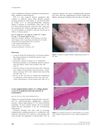 4 citations,
May 2021 in “Biomedicines”
4 citations,
May 2021 in “Biomedicines” Targeting the protein Caveolin-1 might help treat a type of scarring hair loss called Frontal Fibrosing Alopecia.
 24 citations,
September 2008 in “Clinical and experimental dermatology”
24 citations,
September 2008 in “Clinical and experimental dermatology” Repigmentation in vitiligo may come from melanocyte stem cells in the skin.
 19 citations,
March 1997 in “Journal of Cutaneous Pathology”
19 citations,
March 1997 in “Journal of Cutaneous Pathology” Alopecia areata involves specific T-cells, unlike androgenetic alopecia.
 11 citations,
May 2021 in “Dermatologic clinics”
11 citations,
May 2021 in “Dermatologic clinics” PRP and cell therapies may help with hair loss, but more research is needed.
 12 citations,
March 2004 in “International Journal of Dermatology”
12 citations,
March 2004 in “International Journal of Dermatology” Woman's hair loss diagnosis changed from CTE to AA; multiple biopsies important for accurate diagnosis.
 10 citations,
February 2010 in “Acta Histochemica Et Cytochemica”
10 citations,
February 2010 in “Acta Histochemica Et Cytochemica” c-kit affects hair growth and color in alopecia areata and androgenetic alopecia.
 July 2019 in “The European research journal”
July 2019 in “The European research journal” RDW can be a useful marker for inflammation in alopecia areata patients.
 27 citations,
January 2020 in “Experimental Dermatology”
27 citations,
January 2020 in “Experimental Dermatology” Immune cells affect hair growth and could lead to new hair loss treatments.
 25 citations,
February 2012 in “The Journal of Allergy and Clinical Immunology”
25 citations,
February 2012 in “The Journal of Allergy and Clinical Immunology” Finasteride caused a rare skin rash in a man, which improved after stopping the medication.
 6 citations,
April 2017 in “Experimental dermatology”
6 citations,
April 2017 in “Experimental dermatology” CD80CD86 deficiency causes hair loss by disrupting regulatory T cells.
 4 citations,
May 2019 in “Biology open”
4 citations,
May 2019 in “Biology open” Testosterone reduces heart damage and inflammation after injury.
 1 citations,
September 2023 in “Acta dermato-venereologica”
1 citations,
September 2023 in “Acta dermato-venereologica” Certain genetic variants are linked to frontal fibrosing alopecia in Spanish patients.
 1 citations,
June 2021 in “Curēus”
1 citations,
June 2021 in “Curēus” A woman with hair loss had a benign sweat duct tumor found during a scalp biopsy.
 80 citations,
April 2018 in “Trends in Molecular Medicine”
80 citations,
April 2018 in “Trends in Molecular Medicine” Lichen Planopilaris and Frontal Fibrosing Alopecia may help us understand hair follicle stem cell disorders and suggest new treatments.
 15 citations,
January 2014 in “Dermatology”
15 citations,
January 2014 in “Dermatology” Some patients with a type of skin lymphoma can experience a rare, non-scarring hair loss that looks like another hair loss condition but has distinct features.
 1 citations,
June 2014 in “Serbian Journal of Dermatology and Venereology”
1 citations,
June 2014 in “Serbian Journal of Dermatology and Venereology” A woman with discoid lupus improved with treatment after being misdiagnosed with a different hair loss condition.

A high-fat diet caused severe health problems in female macaques but was reversible with a normal diet, while male macaques reacted differently.
 34 citations,
April 2008 in “Journal of the European Academy of Dermatology and Venereology”
34 citations,
April 2008 in “Journal of the European Academy of Dermatology and Venereology” Skin problems like itching, dry skin, and hair loss are more common in hepatitis C patients after interferon treatment, but lichen planus is not linked to the infection.
 27 citations,
March 2018 in “Allergy and asthma proceedings”
27 citations,
March 2018 in “Allergy and asthma proceedings” People with alopecia areata often have higher rates of allergies and autoimmune diseases.
 10 citations,
April 2013 in “Veterinary dermatology”
10 citations,
April 2013 in “Veterinary dermatology” A new skin disease in four Labrador retrievers responded well to immunosuppressive treatment.
 1 citations,
January 2014 in “Hair therapy & transplantation”
1 citations,
January 2014 in “Hair therapy & transplantation” Platelet-rich plasma treatment is not very effective for chronic severe alopecia areata.
 October 2023 in “bioRxiv (Cold Spring Harbor Laboratory)”
October 2023 in “bioRxiv (Cold Spring Harbor Laboratory)” A protein called EGFR protects hair follicle stem cells, and when it's disrupted, hair follicles can be damaged, but blocking certain pathways can restore hair growth.
 1 citations,
April 2018 in “The journal of investigative dermatology/Journal of investigative dermatology”
1 citations,
April 2018 in “The journal of investigative dermatology/Journal of investigative dermatology” Oral tofacitinib significantly improves lichen planopilaris symptoms without adverse effects.
 68 citations,
May 2012 in “Annals of Oncology”
68 citations,
May 2012 in “Annals of Oncology” Some breast cancer chemotherapy can cause permanent hair loss.
 90 citations,
July 2008 in “Dermatologic therapy”
90 citations,
July 2008 in “Dermatologic therapy” Lichen planopilaris is a chronic, scarring hair loss condition with no definitive cure, requiring accurate diagnosis and treatment to manage symptoms.
 April 2023 in “IP Indian journal of clinical and experimental dermatology”
April 2023 in “IP Indian journal of clinical and experimental dermatology” Lichen planus is a chronic autoimmune disease that is hard to treat and more common in women.
 April 2012 in “Informa Healthcare eBooks”
April 2012 in “Informa Healthcare eBooks” Lichen planopilaris is a rare, chronic condition causing hair loss, mainly in middle-aged women, and early treatment is important to prevent permanent baldness.
 11 citations,
March 2007 in “Digestive Diseases and Sciences”
11 citations,
March 2007 in “Digestive Diseases and Sciences” The conditions alopecia areata, primary sclerosing cholangitis, and ulcerative colitis may be linked by shared autoimmune and cell death mechanisms.
 76 citations,
June 2008 in “Journal of the American Academy of Dermatology”
76 citations,
June 2008 in “Journal of the American Academy of Dermatology” The conclusion is that certain scalp tissue changes are characteristic of lichen planopilaris, with mucinous perifollicular fibroplasia being a new feature for diagnosis.
 421 citations,
April 2012 in “The New England Journal of Medicine”
421 citations,
April 2012 in “The New England Journal of Medicine” Alopecia Areata is an autoimmune condition causing hair loss with no cure and treatments that often don't work well.





























